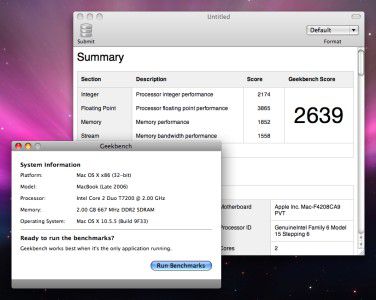- Qualcomm Launches Snapdragon 4 Gen 2 Mobile Platform
- AMD Launches Ryzen PRO 7000 Series Mobile & Desktop Platform
- Intel Launches Sleek Single-Slot Arc Pro A60 Workstation Graphics Card
- NVIDIA Announces Latest Ada Lovelace Additions: GeForce RTX 4060 Ti & RTX 4060
- Maxon Redshift With AMD Radeon GPU Rendering Support Now Available
Promising CPU Benchmark: Geekbench 2
It’s not too unusual for us to receive e-mails from companies which would like to see us begin using their respective benchmarks in our articles, but a recent request caught my eye. A Canadian company by the name of Primate Labs has released a CPU-specific benchmark called Geekbench, and judging from the screenshots on the site, and information given to us, there’s good potential here.
I’ve e-mailed the company for some additional information not covered on its site, but in gist, Geekbench looks to emulate in some regards SPEC’s CPU2006 suite. That means that the benchmark focuses around using a code compiler to test for both Integer and Floating-Point performance, along with memory bandwidth and performance.
Unlike CPU2006, however, Geekbench strives to be an easy benchmark to run, regardless of your skill level. After the application loads, you simply click “Run Benchmarks” to execute… pretty simple. The lack of any customization does bother me, but it’s obvious that the goals of the developers is to keep things congruent between all platforms and CPU architectures (this is somewhat dissimilar to CPU2006 which allows companies to tweak their compiler options).
One of the best parts of Geekbench is that it’s cross-platform, being able to run on Windows, Linux, Mac OS X, and even Solaris. Another perk is that the benchmark is kind of free. For those who want to test, the 32-bit version comes without strings attached, but to open up full 64-bit support, a registration fee of $19.95 is required.
If the benchmark proves to be as effective as it promises, we’ll consider adding it to our upcoming CPU suite revision. If you want to give the benchmark a go now, you can head on over to the official site, and peruse current top scores to see how your PC fares.

Geekbench provides a comprehensive set of benchmarks engineered to quickly and accurately measure processor and memory performance. Designed to make benchmarks easy to run and easy to understand, Geekbench takes the guesswork out of producing robust and reliable benchmark results.




